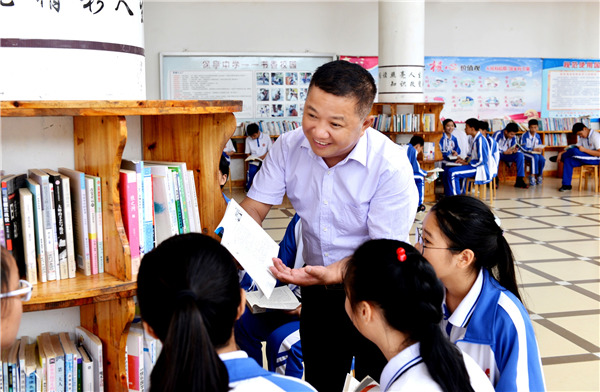
Zhou Xiaohua, head of the Baoting Middle School in Hainan, shares reading time with students at the school library. Zhou came to Hainan in 2015 from Xinyu city of Jiangxi province, as one of the first group of school chiefs hired to improve the poorly developed areas of the island province. [Photo provided to China Daily]
If the future belongs to the young, society might want to discover how the young understand the world.
In Hainan province, an 11-year-old schoolboy and his classmates were given an opportunity to explain.
Their vision was a rich one that goes beyond indoctrination: For them, the future is filled with wonders, not only in scientific understanding but also in human dimensions, including the arts.
For them, the world of the future is replete with knowledge, from the hard sciences, including an understanding of the human body, to artificial intelligence and robotics; from designing traditional Chinese garments to an appreciation of music-the interests and concerns of schoolchildren soar beyond expectations.
In essays responding to a classroom reading titled Putting the Earth in Your Pocket, which was designed to elicit broad thinking, one student, Wang Yujun, a fifth-grader at the iSchool in Chengmai, Hainan, wrote:
"I agree with the author that globalization brings many benefits to countries through the free flow of people and goods. A country cannot grow well alone."
He continued to lay out his view of the world:"Classroom readings have helped me learn that better global governance is needed to avoid or control problems such as the spread of infectious diseases-COVID-19, for instance."
Qin Jianyun, president of iSchool, a cooperative project of an IT park and Beijing National Day School, said, "iSchool, which was built with a 2 billion yuan ($290 million) investment from the IT park, pays much attention to fundamental education-sports, technology and the arts-for children because these things play decisive roles in developing talent for the future."
Qin, who is also vice-president of the Beijing school, known across the country for its efforts in developing students with ambition, integrity, creativity and discipline, continued:
"Based on Chinese culture, we ensure that all our students develop an international vision, which is much needed for promoting the development of the country."
Zhang Kaicheng, a seventh-grader who moved from Haikou, the island province's capital, in September, 2019, when iSchool opened at the Hainan Software Resort Community in Chengmai, put it this way:
"School life here is so inspiring and different from the one I used to attend. We make friends with our teachers, who have similar interests. We enjoy the classes on artificial intelligence, romantic traditional Chinese garments, animation, English drama and challenging outdoor sports like climbing, golf and fencing."
The community, a key industrial park in Hainan, is home to 5,620 firms engaging in innovative information technologies-such as cutting-edge block chain technology.
"With 108 current students, iSchool has pooled 104 teachers, more than half with master's degrees. iSchool is training them to become highly qualified, with broad knowledge and capabilities to meet tide of new students. There will be around 2,400 when all the posts are filled," Qin said.
He said the annual income of an iSchool teacher is around 700,000 yuan, a figure that's the envy of their peers. It is likely to hit 1 million yuan sometime in the not-too-distant future.
Cao Xiankun, director of the Education Department of Hainan Province, said: "Hainan is using iSchool as a pilot to explore innovations in education, cultivate talent and develop a vivid model for basic education for the country."
Hainan, the country's youngest province, which was established in 1988, has been striving in recent years to strengthen basic education for the welfare of residents. In 2015, it launched a program to search for outstanding school heads and experienced teachers across the country to help boost its educational ecology.
The project, the largest ever initiated by the provincial government, has attracted 3,220 applicants from places such as Beijing, Shanghai and Shandong province. To date, the province has hired 300 school heads and excellent teachers from the Chinese mainland, many of them winners of national honors.
About 75 percent of the outsourced school principals and backbone teachers are now providing timely and much-needed assistance to schools in rural areas, which cover 80 percent of the island. Rural areas are home to 60 percent of Hainan's population, which totals 9.4 million, according to the provincial education authorities.
Cao said the principals and teachers have brought with them advanced concepts and management experience that are helping create a new model in the basic education arena, with teachers' capabilities upgraded and students making better progress in their general performance.
Bao Rui, 42, president of the Lingwan Middle School in the Qiongzhong Li and Miao autonomous county in central Hainan, was among the first group of school chiefs hired to improve the poorly developed areas of Hainan.
The first thing Bao did was to rebuild the teaching staff through performance management. He also designed the campus personally and managed to let nearly every corner to bear both traditional and modern education culture to inspire students as soon as they step onto the campus every school day.
"It worked wonders, as most teachers began to teach with renewed enthusiasm and professionalism, winning bonuses and even provincial and national recognition. Those who fail to perform are paid less," Bao said.